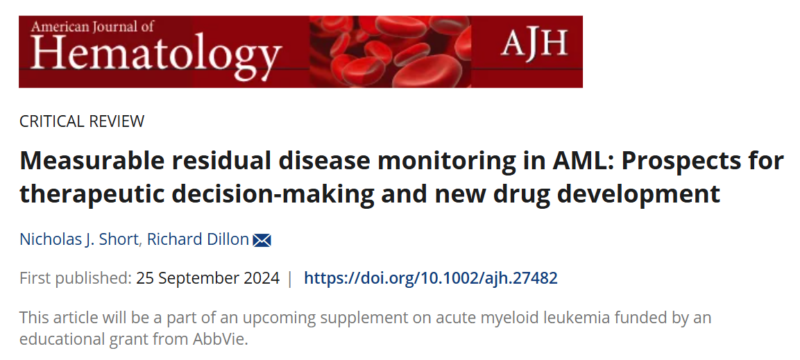
Nicholas Short: Measurable residual disease monitoring in AML
Nicholas Short, Associate Professor at the Department of Leukemia at MD Anderson Cancer Center, shared a post by Hagop Kantarjian, Professor and Chair of the Department of Leukemia at The University of Texas MD Anderson Cancer Center, on X about a recent paper by him and Richard Dillon, Clinical Senior Lecturer in Cancer Genetics in the Department of Medical and Molecular Genetics:
“Very nice of American Journal of Hematology to add a wonderful visual abstract to accompany our review article on MRD in AML.”
Quoting Hagop Kantarjian’s post:
“MRD is highly prognostic in AML and can inform SCT decisions or enrollment into MRD-directed clinical trials. MRD endpoints may also allow for accelerated drug approval in AML.
New review by Nicholas Short and Richard Dillon in American Journal of Hematology.”
Authors: Nicholas Short and Richard Dillon.

Nicholas James Short, MD, is an Associate Professor in the Department of Leukemia at The University of Texas MD Anderson Cancer Center. As a clinical and translational investigator, Dr. Short focuses on adult acute leukemias, with a particular interest in the prognostic and therapeutic implications of measurable residual disease (MRD).
His work also includes developing phase I and II clinical trials to evaluate novel agents and combinations for treating acute myeloid leukemia (AML) and acute lymphoblastic leukemia (ALL).
Richard Dillon, MD, is a Clinical Senior Lecturer in Cancer Genetics at the Department of Medical & Molecular Genetics, King’s College London, and a Consultant Haematologist at Guy’s and St Thomas’ NHS Foundation Trust.
Dr. Dillon leads a research group focused on acute myeloid leukemia (AML), utilizing advanced molecular techniques to improve outcome prediction and tailor treatments for AML patients.
Hagop Kantarjian is the professor and chair of the Department of Leukemia at The University of Texas MD Anderson Cancer Center, where he also serves as the Samsung Distinguished Leukemia Chair in Cancer Medicine.
Dr. Kantarjian’s research focuses on translational-clinical developmental therapeutics in leukemia, spanning over four decades. His contributions include advancements in chronic myeloid leukemia treatment, such as tyrosine kinase inhibitors like imatinib, dasatinib, nilotinib, and bosutinib.
Moreover, he has made discoveries in acute lymphocytic leukemia, myelodysplastic syndrome, and leukemias treatment, resulting in over 20 FDA-approved drugs.
-
Challenging the Status Quo in Colorectal Cancer 2024
December 6-8, 2024
-
ESMO 2024 Congress
September 13-17, 2024
-
ASCO Annual Meeting
May 30 - June 4, 2024
-
Yvonne Award 2024
May 31, 2024
-
OncoThon 2024, Online
Feb. 15, 2024
-
Global Summit on War & Cancer 2023, Online
Dec. 14-16, 2023
